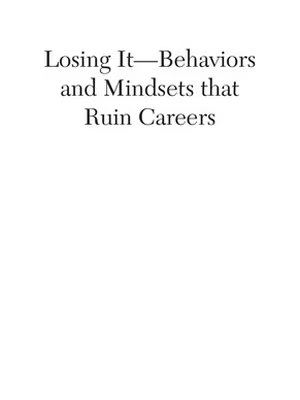Overview
Bill Lane spent 20 years watching high-powered executives at General Electric rise to the top or flame out spectacularly. Losing It is his analysis of the "losers", not people who were bad at their jobs, but brilliant people who got fired because of their behavior. I found this book fascinating because it focuses on the "soft stuff" that business schools usually ignore: personality, attitude, and self-awareness.
The central argument is simple: IQ and technical skills get you hired, but behavior gets you fired. Lane argues that most careers aren't ruined by a lack of talent, but by hubris, poor listening, and treating people badly. Throughout this summary, I’ll help you hold up a mirror to your own work habits to ensure you aren't accidentally sabotaging your own success.
My Take: The "Shadow Resume" Check
Most career advice focuses on building your resume, adding skills, degrees, and big wins. I read this book as a guide to your "Shadow Resume." This is the invisible list of traits people talk about when you leave the room: "He's smart, but he never listens," or "She delivers results, but she burns out her team."
I use this book as a checklist for preventative maintenance. Just like a car engine light, there are warning signs before a career crashes. As you read these takeaways, don't just think about "that annoying coworker." Ask yourself: "Do I have a mild version of this symptom?" Catching these behaviors early is the only way to survive the long game.
Key Takeaways
Technical Brilliance Isn't Enough
The biggest trap for high achievers is believing that being "right" is all that matters. Lane shows that you can be the smartest person in the room, but if you are arrogant or abrasive, you become a liability. Intelligence does not excuse bad behavior. Eventually, the cost of keeping a brilliant jerk outweighs their output.
The "Cover-Up" Kills You
One of the fastest ways to lose a career is the lack of candor. When things go wrong, the instinct is often to spin the truth or hide the data. Lane argues that bad news must travel fast. Leaders can forgive a mistake, but they rarely forgive a surprise or a lie.
Treating "Little People" Badly
I love the "Waiter Rule" concept found in this book. How you treat secretaries, assistants, and junior staff is the truest test of your character. Lane observed that executives who kissed up to the boss but kicked down at the staff were almost always weeded out eventually.
Stop Talking and Listen
Many derailed executives suffered from an inability to listen. They were so busy preparing their next brilliant rebuttal that they missed critical warnings from their team. Listening isn't just polite; it's strategic. If you don't listen, you disconnect yourself from reality.
Chapter-by-Chapter Summary (Themes)
The "Suddenly Stupid" Phenomenon
Lane opens by describing the shock of seeing high-potential stars suddenly fired. He explains that these people didn't lose their IQ points overnight; they lost their perspective. This section sets the stage: your career health is fragile, and past success doesn't immunize you against future stupidity.
The Arrogance Trap
This section focuses on the danger of the ego. When leaders start believing their own press clippings, they stop taking feedback. Lane shares stories of executives who refused to change course because admitting a mistake felt like a weakness, leading to disaster.
The Integrity Gap
Lane discusses the subtle erosion of integrity. It rarely starts with a massive fraud; it starts with "massaging the numbers" to make a quarter look better. The lesson here struck me hard: once you start spinning the truth, you are on a path that is very hard to get off.
The Human Disconnect
Here, the book looks at how leaders relate to others. Some executives view people merely as "resources" to be used and discarded. Lane illustrates that you need loyalty to survive tough times, and you don't get loyalty by dehumanizing your workforce.
The "Check-the-Box" Mentality
This theme covers the danger of bureaucracy over substance. Some managers focus entirely on process, meetings, and reports while missing the actual market reality. They look busy and efficient, but they are actually steering the ship off a cliff because they aren't looking at the horizon.
Sexual Harassment and Bad Judgment
Lane doesn't shy away from the personal scandals that ruin careers. He discusses how a lack of impulse control and a sense of entitlement lead powerful people to make catastrophic personal choices. It’s a stark reminder that your personal conduct is never truly separate from your professional life.
How to Save Yourself
The final sections offer a roadmap for redemption. If you spot these behaviors in yourself, you have to humble yourself and ask for help. Lane emphasizes that recovery is possible, but only through radical self-honesty and a genuine willingness to change behavior.
Main Concepts
The Behavior/Results Matrix
A core concept I took from the book is how companies evaluate people. It's not a single line; it's a matrix of Results vs. Values (Behavior). Lane's stories confirm that while high results might protect you for a while, low values are a ticking time bomb.
Career Builders
- Delivers results and lives the values
- Shares credit with the team
- Admits mistakes immediately
- Listens to dissenting opinions
- Treats everyone with respect
- Asks "What did I miss?"
Career Killers
- Delivers results but destroys the culture
- Hoards credit and shifts blame
- Hides bad news or spins data
- Interrupts and shuts down debate
- Kisses up, kicks down
- Assumes "I already know that"
The "Control Freak" Paradox
Lane discusses the paradox of control: the more you try to control every detail (micromanagement), the less control you actually have. Executives who can't delegate end up becoming bottlenecks. They ruin their careers by burning themselves out and alienating the very people they need to execute the work.
How to Apply the Ideas This Week
You don't have to be a CEO to use these lessons. Here are a few practical ways I’m applying Bill Lane’s warnings to my own work life this week.
- Audit your listening ratio. In your next meeting, track how much you talk versus how much you listen. If you are talking more than 50% of the time, try asking two open-ended questions before you make your next statement.
- Identify your "Trigger." We all have a situation that makes us lose our cool or get defensive. Write it down (e.g., "When I'm interrupted"). Knowing your trigger helps you pause before you react poorly.
- Do a "values check" on a recent win. Look at a recent success. Did you achieve it in a way that you’re proud of? Did you acknowledge the people who helped? Send a quick thank-you note to someone who didn't get enough credit.
- Ask for brutal feedback. Ask a trusted peer: "What is one thing I do that makes it harder to work with me?" Then, and this is the hard part, just say "Thank you" and don't argue.
Memorable Quotes
“You can be the smartest guy in the room, but if nobody wants to work with you, you’re worthless.”
“Careers are not ruined by a lack of competence, but by a lack of character.”
“Tell the truth, tell it fast, and tell it all. The cover-up is always worse than the crime.”
Who I Think Should Read This Book
- Fast-rising managers: If you've been promoted quickly, your ego is your biggest enemy. This book grounds you in reality.
- Corporate Leaders: Anyone managing large teams needs to understand how their behavior ripples down and affects culture.
- People feeling "stuck": If you are delivering results but not getting promoted, this book might reveal the behavioral blind spot holding you back.
- HR Professionals: It provides a clear vocabulary for explaining why a "high performer" might need to be let go due to toxic behavior.
What Other Readers Are Saying
Losing It is often praised for being brutally honest compared to standard polite business books. On Amazon, it generally holds a rating around 3.0 out of 5 stars. Readers love the "insider" stories from the Jack Welch era at GE, finding them both entertaining and instructive.
On Goodreads, the rating hovers around 3.0 out of 5 stars. Some readers feel the book relies too heavily on GE anecdotes and can feel a bit like a memoir. However, the consensus is that the lessons on integrity and ego are timeless, even if the corporate examples are from a specific era.
-
Read reviews on Amazon:
Losing It on Amazon
* Affiliate link. I earn from qualifying purchases.
- Read reviews on Goodreads: Losing It on Goodreads
Final Thoughts
Reading Losing It was a sobering experience for me. It made me realize that "soft skills" aren't just nice-to-haves; they are the guardrails that keep your career on the road. It’s easy to judge the people in the book who crashed, but the real value comes when you ask, "Where am I acting a little bit like them?"
If you feel like you're hitting a ceiling, or if you just want to ensure you survive the climb to the top, this book is a necessary reality check. It teaches you that the most dangerous person to your career isn't your competitor or your boss, it's usually you.
Ready to Protect Your Career?
If this summary resonated with you, the full book is filled with specific war stories and examples that drive the points home. It's a quick read that could save you years of trouble.
Get Losing It on Amazon* Affiliate link. I earn from qualifying purchases.

